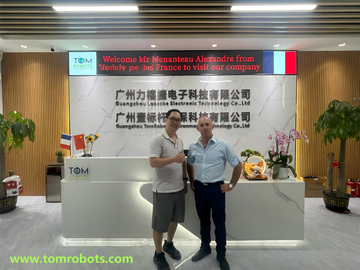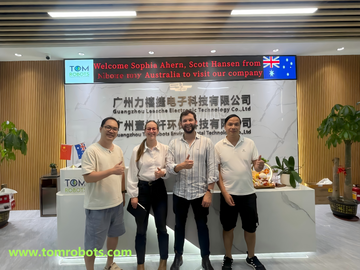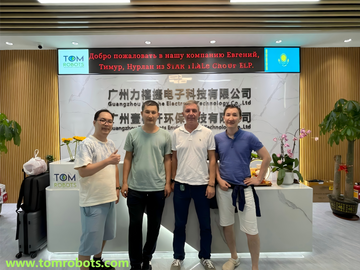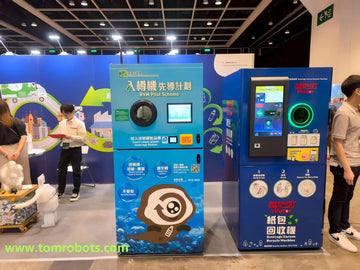From French Market Demands to TomRobots L88 Reverse Vending Machine's Problem-Solving Power - A Record of Menanteau Alexandre's In-Depth Inspection
διά TomRobots επί Sep 18, 2025

On September 16, 2025, Mr. Menanteau Alexandre, a senior environmental protection equipment purchaser from France, made a special trip to visit TomRobots, kicking off an in-depth exchange focused on intelligent beverage bottle recycling solutions. As a professional with years of experience in the French recycling market, Mr. Menanteau Alexandre came with a clear goal: to find practical technical solutions to the pain points in France's current recycling system, such as low plastic bottle processing efficiency and high sorting costs. The L88 intelligent plastic bottle recycling machine independently developed by TomRobots, with its technological breakthroughs in the field of reverse vending machines, became the core focus of this inspection and demonstrated strong potential to break the existing predicament in the French market during the exchange.
The "Sweet Trouble" of the French Recycling Market: The Contradiction Between Strong Demand and Lagging Efficiency
When it comes to environmental protection in France, it has always been at the forefront within the European Union. Data shows that France produces more than 12 billion plastic beverage bottles every year, of which about 65% enter the recycling system. Although this recycling rate is higher than the EU average, it hides an undeniable "efficiency shortcoming". Currently, mainstream plastic bottle recycling in France still relies on a combination of manual sorting and traditional recycling bins, which not only consumes a lot of labor costs but also leads to low purity of recycled materials due to insufficient sorting accuracy, thereby affecting the economic benefits of subsequent recycling and reuse.
"In France, we have spent a lot of effort promoting recycling concepts, and consumers' willingness to participate is already very strong, but the processing capacity of recycling terminals cannot keep up," Mr. Menanteau Alexandre admitted during the exchange. Traditional recycling bins are often mixed with various types of garbage, and staff need to sort plastic bottles one by one. A single recycling point requires at least 2 workers to spend 3 hours sorting every day; while the existing simple recycling equipment either cannot accurately identify plastic bottles of different materials or lacks efficient compression functions, resulting in frequent full bins of the equipment and high transportation costs. This situation has plunged France's recycling industry into an awkward predicament of "high willingness but low efficiency".
It is against this background that recycling vending machines integrating "accurate identification, intelligent sorting, and efficient compression" have become an urgent need in the French market. Such equipment can not only reduce manual intervention and improve recycling efficiency but also enhance the purity of recycled materials through standardized processing procedures, creating higher economic value for recycling enterprises. The L88 intelligent plastic bottle recycling machine from TomRobots precisely addresses this market pain point, which is why it has become the core target of Mr. Menanteau Alexandre's cross-border inspection.
Witnessing the L88 Up Close: How Three Core Functions Solve French Recycling Problems
In TomRobots' product exhibition area, the moment the L88 intelligent plastic bottle recycling machine was started, Mr. Menanteau Alexandre's attention was firmly attracted. From putting in different types of plastic bottles to the equipment completing the entire process of identification, sorting, and crushing, the whole process took only 8 seconds, which made him, who was accustomed to the "slow" operation of traditional equipment, exclaim repeatedly: "This is exactly the equipment we need in France!"
1. AI Recognition: Turning "Accurate Recycling" from a Concept into Reality
One of the biggest pain points of traditional recycling equipment is its inability to effectively distinguish recyclable plastic bottles from other garbage, leading to a large amount of non-recyclable materials being mixed in and increasing subsequent processing costs. However, the AI intelligent recognition system equipped with the L88 has completely solved this problem. Trained on millions of samples, this system can accurately identify plastic bottles of different materials such as PET, HDPE, and PP, while excluding non-target items such as glass bottles, cans, and plastic bags.
During the on-site test, the staff successively put in 500ml PET mineral water bottles, 1L HDPE juice bottles, and old plastic bottles with labels and stains. The L88 could complete the identification within 0.3 seconds and prompt the user through voice: "Recyclable plastic bottle identified" or "Please take out non-recyclable items". What's more worth mentioning is that even if the plastic bottles are deformed or their labels are damaged, the recognition accuracy still remains above 99.5%. "In French supermarkets, consumers may put in various items casually. With such a recognition system, we no longer have to worry about the recycling bins being 'contaminated'", Mr. Menanteau Alexandre said excitedly while observing the operation of the equipment.
The value of this function to the French market is self-evident: on the one hand, it can ensure that all items entering the recycling process are qualified plastic bottles, greatly improving the purity of recycled materials; on the other hand, through voice and screen prompts, it can also guide consumers to sort correctly, further strengthen recycling awareness, and form a virtuous cycle of "identification - guidance - standardization".
2. Intelligent Sorting: Providing Technical Support for France's "Classified Recycling" System
Plastic bottle recycling in France has long entered the "era of classification" - different materials of plastic bottles have huge differences in recycling processes and values. For example, PET bottles can be used to make textile fibers, while HDPE bottles are suitable for producing plastic pipes. If they are recycled in a mixed manner, it will not only reduce the quality of recycled products but also increase the cost of separation. However, traditional manual sorting is difficult to achieve such fine classification, and the intelligent sorting function of the L88 just fills this gap.
Inside the L88, there are 3 independent sorting channels, corresponding to PET, HDPE, and other recyclable plastic bottles respectively. After the AI recognition system confirms the material of the plastic bottle, the sorting robotic arm will accurately send it into the corresponding channel within 1 second, and the whole process requires no manual intervention. On-site, the staff continuously put in 20 plastic bottles of different materials, and the L88 achieved 100% sorting accuracy. "This is crucial!" Mr. Menanteau Alexandre took out his mobile phone to record the sorting process, "In France, a medium-sized recycling enterprise loses more than 100,000 Euros every year due to mixed materials. With the sorting function of the L88, this loss can be completely avoided."
More importantly, the sorting data of the L88 can also be uploaded to the cloud management system in real-time. Recycling enterprises can clearly understand the recycling volume of plastic bottles of different materials through the background, providing data support for procurement and recycling plans. This "visualized" recycling management model is exactly the digital tool that French recycling enterprises urgently need at present.
3. Efficient Crushing: Reducing Recycling and Transportation Costs by 40%
"In France, transportation costs are the second largest expenditure for recycling enterprises, second only to labor costs," Mr. Menanteau Alexandre explained. Traditional recycling equipment lacks effective compression functions, so a 100L capacity equipment can hold at most 80 uncompressed plastic bottles and needs to be transported 3-4 times a day; while the high no-load rate of transport vehicles and frequent round-trips further push up the costs.
The crushing function of the L88 fundamentally solves this problem. Its built-in hydraulic crushing device can compress plastic bottles to about 1/5 of their original volume - a standard 500ml PET bottle has a thickness of only 2 centimeters after compression. On-site tests show that the 120L capacity recycling bin of the L88 can hold 400 plastic bottles after the crushing function is activated, which is 5 times that of traditional equipment. "This means that one L88 only needs to be transported once a day, and transportation costs can be reduced by at least 40%," Mr. Menanteau Alexandre calculated, "Taking a medium-sized community recycling point in France as an example, after using the L88, the monthly transportation cost alone can be saved by 2,000 Euros."
Moreover, the crushed plastic bottles are stacked neatly, which can also reduce shaking and damage during transportation, further ensuring the integrity of recycled materials. This combination of "efficient compression + low-cost transportation" has taken the competitiveness of the L88 in the French market to a higher level.
From Technical Recognition to Cooperation Intention: How Does the L88 Adapt to French Market Demands?
During the inspection, Mr. Menanteau Alexandre not only focused on the technical performance of the L88 but also conducted in-depth communication with the TomRobots team regarding the special needs of the French market. For example, the voltage standard in France is 220V, and some areas have humid climates. Can the L88 adapt to these environments? In response to this question, TomRobots' engineers demonstrated the "customized adaptability" of the L88 on-site - the equipment can adjust the power module according to the voltage standards of different countries, and at the same time, the body is made of anti-corrosion steel with an IP54 waterproof rating, which can fully cope with the rainy climate in France.
"In addition to technical adaptation, the adaptation of the business model is also very important," Mr. Menanteau Alexandre said. In France, recycling vending machines usually cooperate with supermarkets and convenience stores to attract consumers through methods such as "bottle return for cash" and "point redemption". The L88 supports access to France's mainstream payment systems and point platforms. After consumers put in plastic bottles, they can receive real-time Euro cash refunds or shopping points from cooperating supermarkets. This design perfectly fits with France's existing recycling incentive system.
"I can't wait to bring the L88 back to France for on-site testing," Mr. Menanteau Alexandre clearly expressed his intention to cooperate when the inspection was coming to an end. He plans to select 3 different types of scenarios after returning to France - large supermarkets, community centers, and campuses, and deploy 1 L88 in each for a 3-month pilot operation. The focus is on testing the equipment's stability, user acceptance, and cost-saving effects. "If the pilot effect meets expectations, I will immediately launch a large-scale procurement plan, initially planning to order 50 units to cover major cities in northern France."
For TomRobots, this intention to cooperate not only means a "stepping stone" to enter the French market but also confirms the competitiveness of the L88 intelligent plastic bottle recycling machine in the international market. "We have always believed that a good recycling equipment should not only solve technical problems but also meet market demands," said the product manager of TomRobots. "The original intention of developing the L88 is to make recycling more efficient, economical, and convenient, and Mr. Menanteau Alexandre's recognition is the best verification of this concept."
Beyond Cooperation: How Can the L88 Help France Achieve Its "Circular Economy" Goals?
The French government has proposed that by 2030, it will achieve 100% recycling and reuse of plastic bottles and reduce carbon emissions in the recycling industry by 30% at the same time. To achieve this goal, relying solely on consumers' participation is far from enough; it also requires technological innovation to promote the efficiency improvement of the entire recycling chain. The introduction of the L88 intelligent plastic bottle recycling machine may become an important boost for France to achieve this goal.
In the short term, the L88 can directly reduce labor costs and transportation costs in the recycling link, improve the profitability of recycling enterprises, attract more capital to enter the recycling industry, and form a virtuous cycle of "technological upgrading - cost reduction - industry expansion". In the long term, the standardized and digital recycling model brought by the L88 will promote the transformation of France's recycling industry from "labor-intensive" to "technology-intensive", improving the efficiency and competitiveness of the entire industry.
"In France, we have talked about the 'circular economy' for many years, but its real implementation requires specific technical support," Mr. Menanteau Alexandre said when leaving. "The L88 from TomRobots makes me see the possibility of achieving this goal."
Mr. Menanteau Alexandre's visit this time not only laid a solid foundation for the cooperation between TomRobots and the French market but also made us see the huge potential of intelligent recycling equipment in the global environmental protection cause. In the future, TomRobots will continue to deepen technological innovation, with the L88 as the core, launch more recycling vending machine products adapted to the needs of different national markets, and contribute "Chinese wisdom" and "Chinese solutions" to global plastic pollution governance. We also look forward to seeing the figures of L88 intelligent plastic bottle recycling machines on the streets and lanes of France in the near future, practicing the concept of "green recycling" together with French consumers and building a sustainable future.



